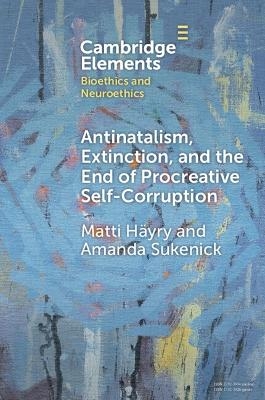
Antinatalism, Extinction, and the End of Procreative Self-Corruption
Seiten
2024
Cambridge University Press (Verlag)
978-1-009-45530-5 (ISBN)
Cambridge University Press (Verlag)
978-1-009-45530-5 (ISBN)
This Element provides an exploration of antinatalism, the view that assigns a negative value to reproduction. It includes the history of Western philosophy, an analysis of the concept of antinatalism, and outlines a normative view defending antinatalism. This title is also available as Open Access on Cambridge Core.
This Element provides an exploration of antinatalism, the view that assigns a negative value to reproduction. First, the history of Western philosophy as a two-and-a-half millennia reaction to antinatalist sentiments. Human life has no obvious meaning and philosophers have been forced to build elaborate theories to invent imaginary purposes. Second, analysis of the concept of antinatalism in the light of human extinction. If people stop having children, the species will cease to exist, and this prospect has prompted attempts to find alternatives and excuses. Third, outlines a normative view defending antinatalism both theoretically and practically. If it is wrong to bring about suffering in the absence of redeeming meaning and if it is possible to create meaning only by imposing a pronatalist mentality upon children before they can make up their own minds, parents morally corrupt themselves by procreating. This title is also available as Open Access on Cambridge Core.
This Element provides an exploration of antinatalism, the view that assigns a negative value to reproduction. First, the history of Western philosophy as a two-and-a-half millennia reaction to antinatalist sentiments. Human life has no obvious meaning and philosophers have been forced to build elaborate theories to invent imaginary purposes. Second, analysis of the concept of antinatalism in the light of human extinction. If people stop having children, the species will cease to exist, and this prospect has prompted attempts to find alternatives and excuses. Third, outlines a normative view defending antinatalism both theoretically and practically. If it is wrong to bring about suffering in the absence of redeeming meaning and if it is possible to create meaning only by imposing a pronatalist mentality upon children before they can make up their own minds, parents morally corrupt themselves by procreating. This title is also available as Open Access on Cambridge Core.
1. Introduction; 2. Western philosophy as a struggle against antinatalism; 3. Antinatalism and extinction; 4. Procreative self-corruption; References.
| Erscheinungsdatum | 02.03.2024 |
|---|---|
| Reihe/Serie | Elements in Bioethics and Neuroethics |
| Zusatzinfo | Worked examples or Exercises |
| Verlagsort | Cambridge |
| Sprache | englisch |
| Themenwelt | Geisteswissenschaften ► Philosophie ► Ethik |
| Sozialwissenschaften ► Soziologie | |
| ISBN-10 | 1-009-45530-3 / 1009455303 |
| ISBN-13 | 978-1-009-45530-5 / 9781009455305 |
| Zustand | Neuware |
| Haben Sie eine Frage zum Produkt? |
Mehr entdecken
aus dem Bereich
aus dem Bereich
unsere kollektive Verantwortung
Buch | Hardcover (2023)
wbg Theiss in Wissenschaftliche Buchgesellschaft (WBG) (Verlag)
35,00 €


